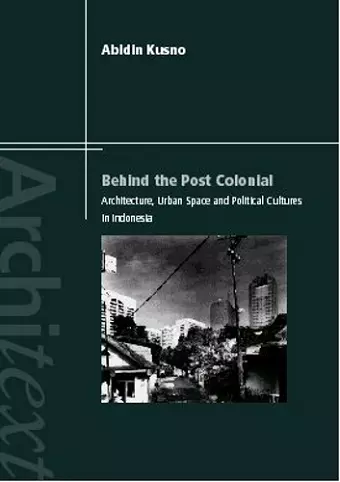Behind the Postcolonial
Architecture, Urban Space and Political Cultures in Indonesia
Format:Paperback
Publisher:Taylor & Francis Ltd
Currently unavailable, and unfortunately no date known when it will be back

In Behind the Postcolonial Abidin Kusno shows how colonial representations have been revived and rearticulated in postcolonial Indonesia. The book shows how architecture and urban space can be seen, both historically and theoretically, as representations of political and cultural tendencies that characterize an emerging as well as a declining social order. It addresses the complex interactions between public memories of the present and past, between images of global urban cultures and the concrete historical meanings of the local. It shows how one might write a political history of postcolonial architecture and urban space that recognizes the political cultures of the present without neglecting the importance of the colonial past. In the process, it poses serious questions for the analysis and understanding of postcolonial states.
'A rich and detailed analysis of Indonesian politician cultures and their inscription and shaping in urban space. Yet, without its theoretical base, elaborating the politics of architecture and urban space, this important book could not have been written this way, perhaps it could not have been written at all.'Journal of Southeast Asian Studies
'Unquestionably the most provocative assessment of architecture and urban design in Indonesia since Independence.'- Planning Perspectives
'Kusno has the merit of linking more traditional kinds of architectural and urban studies to one of the more pressing social and political issues of the day ... This is an illuminating work.' - Journal of Urban History
'A rich and detailed analysis of Indonesian politician cultures and their inscription and shaping in urban space. Yet, without its theoretical base, elaborating the politics of architecture and urban space, this important book could not have been written this way, perhaps it could not have been written at all.' - Journal of Southeast Asian Studies
'Interesting, well documented and scholarly. It is well set out, rooted in the literature, with a good introduction, and offers a different kind of interpretation of political history as seen through changing architecture and urban planning.'-Annuals of Geography
'Interesting, well documented and scholarly ... offers a different kind of interpretation of political history as seen through changing architectureand urban planning ... of particular value to urban and historical geographers, to architects and urban planners, and to those with an interest in Indonesia.' - Annals of the Association of American Geographers
'Unquestionably the most provocative assessment of architecture and urban design in Indonesia since Independence.' - Planning Perspectives
'The main focus of the book is the reworking of the colonial trauma.' - SOJOURN:JOURNAL OF SOCIAL ISSUES IN SOUTHEAST ASIA
'The book provides an interesting analysis of the way the peoples of Indonesia have constructed their own versions of modernity since independence, interweaving them with their experiences of the Dutch colonial past.' - Annuals of Geography
'A valuable book about discourses of architecture and urban design in postcolonial Indonesia. The focus on constraints, dilemmas and unforeseen outcomes create a challenging theoretical framework for further research.' - International Journal of Comparative Sociology
'As a study of colonial and postcolonial Indonesia it is a substantial contribution.' - International Planning Studies
'Kusno's careful renarration ... contests the discourses of globalization of contemporary cities made popular by such theorists as Castells and Sassen and accepted at face value in many urban geography, political economy and sociology discussions at present. Kusno has also given social and political theorists, historical sociologists and practising architects and urban planners the world over a book to think beyond, and not just behind, the postcolonial.' - Thesis Eleven, number 73
'The first I've seen to address these issues of space and class in a comprehensive and clear manner. ... demonstrates the merits of a cross-disciplinary, genealogical approach to current urban issues in Indonesia as well as in the larger postcolonial context.' - Julie Shackford-Bradley
'The book ... arouses high expectations, and this reviewer was not disappointed.'-Danny O'Hare, Australian Planner, 2002
'A worthwhile contribution to our understanding of the way in which the design professions influence, and are influenced by, the relationship between political culture and the built environment ... adds to the growing literature on how urban space is shaped and reshaped to increase political power in autocratic regimes.' -Danny O'Hare, Australian Planner, 2002
'Of interest to academics, students and practitioners concerned with urban design and planning in postcolonial countries in general and Indonesia in particular ... well written, edited and illustrated.' -Danny O'Hare, Australian Planner, 2002
'Kusno has the merit of linking more traditional kinds of architectural and urban studies to one of the more pressing social and political issues of the day ... This is an illuminating work.' - Journal of Urban History, Vol. 31 No. 5, July 2005
ISBN: 9780415236157
Dimensions: unknown
Weight: 490g
266 pages